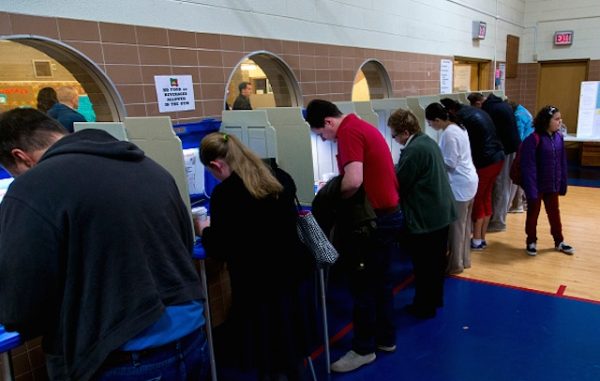
A poll finds that a majority of all Americans, and 78 percent of Hispanics, approve of his executive order.
by Ronald Brownstein
In a measure of the challenge Republicans could face with Hispanic voters next year, President Obama’s executive action to legalize millions of undocumented immigrants drew significant support from all elements of that community in a new opinion survey this week.
The survey, co-sponsored by MSNBC and Telemundo and conducted by the Marist Poll, found that 57 percent of all adults and 78 percent of all Hispanics approved of Obama’s executive action last year to provide legal status—but not citizenship—for as many as five million immigrants illegally in the United States.
Republicans, meanwhile, have almost universally condemned Obama’s decision. Andrew Hanen, a U.S. District court judge in Texas, ruling in a lawsuit brought by 26 Republican-leaning states, has issued an injunction blocking the order. (The administration is appealing.) In January, all but 10 House Republicans voted to overturn the decision. In the Senate, Democrats used procedural tools to block Republicans from bringing a repeal measure to a vote.
The issue looms as a point of clear contrast in the 2016 presidential race as well. While Hillary Clinton, the presumptive Democratic nominee, has endorsed Obama’s action, the leading GOP presidential candidates have already pledged to reverse it if elected. Even possible candidates who at various points have supported a legislated pathway to citizenship for undocumented immigrants—including former Florida Gov. Jeb Bush, Florida Sen. Marco Rubio, and South Carolina Sen. Lindsey Graham—have denounced Obama’s unilateral action.
But the MSNBC/Telemundo/Marist poll found that Obama’s action enjoys lopsided support even in the corners of the Hispanic community that Republicans consider most open to them for 2016. The survey, conducted from March 23 to April 5, included an oversample of Hispanic respondents, allowing for more detailed analysis of subgroups within that community.
In 2012, for instance, Mitt Romney carried 35 percent of Hispanics holding at least a four-year college degree, 11 percentage points better than his showing among non-college Hispanics, according to a National Journal analysis of exit poll results. But in the new survey, college-plus Hispanics went 81 percent to 17 percent in favor of Obama’s executive action, according to detailed results provided to Next America by Marist. (Non-college Hispanics supported Obama’s decision by 77 percent to 21 percent.)
In 2012, Romney carried 37 percent of married Hispanics, but in the new poll they split 69 percent to 28 percent in favor of Obama’s action. (Single Hispanics favored it even more emphatically: 82 percent to 17 percent.)
Viewed by age, attitudes toward Obama’s action more closely tracks the 2012 preferences. In 2012, Romney won 32 percent of Hispanics 45 and older, and in the new survey that group breaks 71 percent to 27 percent in support of Obama’s action. Among Hispanics younger than 45, support for Obama’s action rises to 81 percent, with just 18 percent opposing. (Obama won 73 percent of those voters in 2012.)
Support varied little by gender: 75 percent of Hispanic men and 79 percent of Hispanic women endorsed Obama’s decision. Nativity provided only a slightly larger difference: 72 percent of U.S.-born Hispanics, compared to 84 percent of those born abroad, said they supported Obama’s decision.
Among other racial groups, African-Americans also supported the action by 75 percent to 21 percent, while whites split almost exactly evenly, with 50 percent supporting, and 49 percent opposing. While a 52 percent majority of those 60 and older opposed it, just over two-thirds of adults under 30 backed the decision.
One bright spot for Republicans is that the poll suggested many Latinos would be accept an immigration reform plan that provided the undocumented with legal status while stopping short of full-scale citizenship.
A 49 percent plurality of Hispanic respondents in the poll agreed that “it is more important that the president and Congress not pass an immigration reform bill unless it includes a pathway to U.S. citizenship.” But a substantial 44 percent endorsed the competing sentiment that “it is more important that the president and Congress pass an immigration reform bill even without a pathway to U.S. citizenship.”
Opinions on those choices varied little by age or income, but U.S. born and college-educated Hispanics tilted slightly more toward insisting that any reform plan include a pathway to full citizenship, as the bipartisan bills that passed the Senate in 2013 and 2006 both provided. Hispanics born abroad, and those without college degrees, were relatively more willing to accept a plan that provided legal status without citizenship.
That suggests that for many in those groups, relief from the immediate fear of deportation trumps the long-run possibility of eventual citizenship. Some congressional Republicans have suggested that legal status short of full-scale citizenship might be a compromise outcome in immigration reform legislation—though most Republicans in Congress and the 2016 presidential field have not explicitly endorsed legalization for the estimated 11 million undocumented immigrants.

